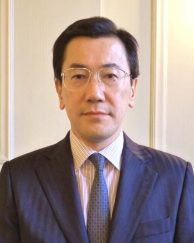 Seminar
SeminarThursday 15 March 2012
6:00pm – 7:45pm
North Korean Security Challenges – Post Kim Jong-il
Drinks reception from 8:45pm
Daiwa Foundation Japan House
Organised by the Daiwa Anglo-Japanese Foundation
North Korea is a source of security tensions in Northeast Asia, and the regime there poses a range of problems for its own people, its neighbours and the wider world. According to an IISS Strategic Dossier (July 2011), the threats emanating from North Korea include its two nuclear programmes, the world’s third largest chemical weapons arsenal, a range of ballistic missiles, and the world’s fourth largest army. North Korea is the most militarised country on earth. In the past, it has launched Nodong and Taepodong missiles over Japan, and in 2010 it attacked the South Korean island of Yeonpyeong, resulting in the death of two marines and two civilians on the South Korean side.
Will the sudden death of General Kim Jong-il in December last year and the leadership transition to the young Kim Jong-un ease the tension? What are the prospects for a resumption of the six-party talks, and an end to threats of violence against neighbouring countries? On the other hand, the country inherited by Kim Jong-un is internationally isolated, subject to economic sanctions and afflicted by extreme poverty, presenting a constant risk of internal collapse. All in all, North Korean instability poses one of the most complex contemporary challenges to international security. Three speakers discussed the security challenges presented by the new regime in North Korea to the US, South Korea and Japan.
Here is a link to an article by Dr John Swenson-Wright in BBC news.
Mark Fitzpatrick Presentation Shingo Yamagami PresentationAbout the contributors

Mark Fitzpatrick
Mark Fitzpatrick is Director of the Non-Proliferation and Disarmament Programme at the International Institute for Strategic Studies (IISS) in London. His programme focuses on nuclear and missile challenges posed by Iran, North Korea and other outlier states, and on nuclear security and nuclear disarmament issues. He is the editor of [i]North Korean Security Challenges[/i] (July 2011) and of five other IISS Strategic Dossiers on countries and regions of proliferation concern. He has lectured throughout the world and is a frequent media commentator on proliferation topics. He joined the IISS in October 2005 after a 26-year career in the US Department of State, including as Deputy Assistant Secretary for Non-Proliferation (acting). He earned a Master’s degree in Public Policy from the Kennedy School of Government at Harvard University, and he attended a one-year post-graduate study programme (1990-1991) at the Japanese National Institute of Defence, where his dissertation on Korean unification was published in journals in Japan and South Korea.

Dr John Swenson-Wright
Dr John Swenson-Wright is Associate Fellow, Asia Programme of Chatham House and Senior Lecturer in Japanese Politics and International Relations at the Faculty of Asian and Middle Eastern Studies (FAMES), University of Cambridge. He has made presentations to a variety of institutions including the IISS, the Royal College of Defence Studies, the Organisation for Economic Co-operation and Development (OECD), and the Foreign Affairs Committee of the UK House of Commons. His recent publications include: “Contending with Regional Uncertainty: Japan’s Response to Contemporary East Asian Security Challenges,” in Patricia Nelson and Marie Sodeberg, eds, [i]Perspectives on Change in Japanese Politics and Economics [/i](Routledge, 2010), “East Asia: Consistency and Sensitivity Needed in a Strategically Vital Region,” in Robin Niblett, ed., [i]America and A Changed World: a Question of Leadership[/i] (WileyBlackwell, 2010), and “The Limits of Normality: Japanese-Korean post-Cold War Interactions,” in David Welch, ed., [i]Japan as a Normal Nation[/i] (University of Toronto Press, 2010).

Shingo Yamagami
Shingo Yamagami is a Minister (Political) of the Embassy of Japan in London. He graduated from Tokyo University and joined MOFA in 1984. During most of his career he has been dealing with Japan’s relations with the USA and China, which includes the Embassy in Washington (1987-90), the Second North American Division of the Ministry of Foreign Affairs of Japan (MOFA), the China and Mongolian Division as Deputy Director (1996-98) and the Consulate-General in Hong Kong (1998-2000). He has wide experience in treaty affairs including his roles as Assistant Director (1990-93) and then Director of the Treaties Division (2004-07). He was seconded to the National Police Agency and served as Deputy Head (Director of Police Administration) of the Ibaraki Prefectural Police (2007-09).